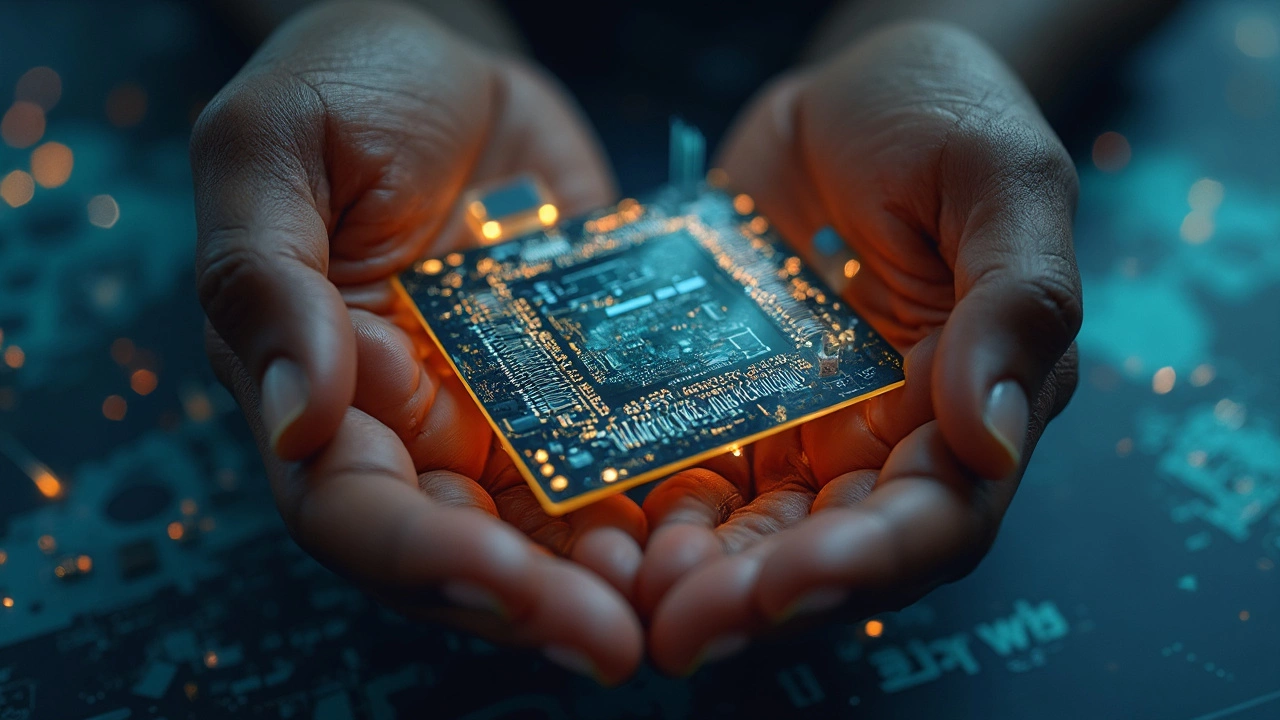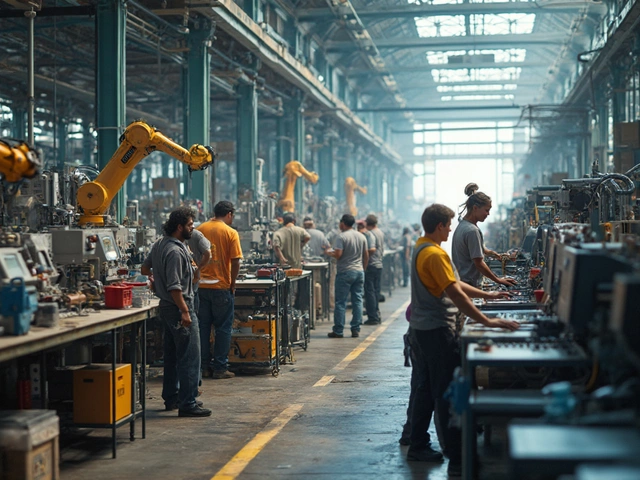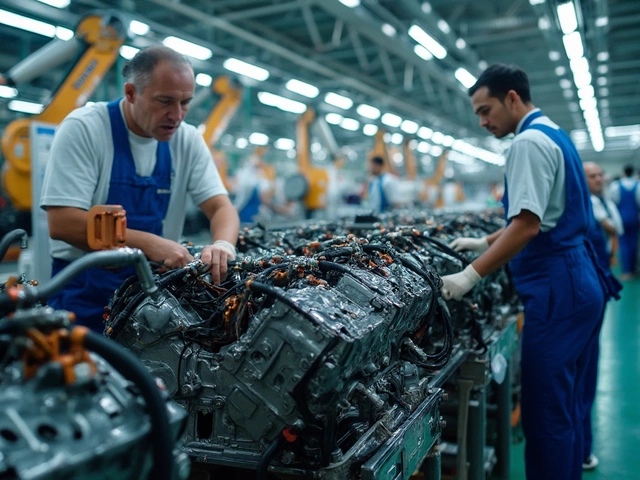TSMC isn’t just a chipmaker—it’s the silent engine inside almost every gadget you own, from smartphones to laptops, and even cars. If you check who has their money wrapped up in TSMC, you’ll find a lineup of deep-pocketed players ranging from government funds to the world’s largest investment companies.
Investors love TSMC for one reason: dominance. The company's grip on advanced chip manufacturing means steady growth, and if you’re watching electronics manufacturing in India, you’ll notice that TSMC’s moves often ripple all the way here. Their biggest shareholders aren’t just betting on chips—they’re wagering on the tech future itself.
So who’s putting their chips on TSMC? And why does this matter for anyone interested in tech, especially as India ramps up efforts to boost its own manufacturing scene? Understanding who calls the shots at TSMC gives you an insider’s look at where the money—and the power—sits in the global electronics industry.
- TSMC at a Glance: Why Investors Flock In
- The Titans: Biggest Shareholders in TSMC
- Foreign Investors and the India Connection
- What TSMC’s Ownership Means for Electronics Manufacturing
TSMC at a Glance: Why Investors Flock In
Picture this: if you use a smartphone or laptop, there’s a good chance the brains of your device came from TSMC’s factories. TSMC, which stands for Taiwan Semiconductor Manufacturing Company, built its reputation on making the world’s most advanced chips. Big names like Apple, AMD, and Qualcomm trust TSMC with their most critical products. That alone puts the company at the center of the global tech supply chain.
So, why do investors jump at the chance to buy TSMC stock? The main reason: it’s a proven moneymaker in an industry where most companies are still scrambling to keep up. Check out these quick facts that have investors lining up:
- TSMC controls over 60% of the global foundry market, giving it massive bargaining power.
- The company is the go-to supplier for the world’s most advanced 3nm and 5nm chips, which are used in flagship smartphones and high-performance computers.
- Even during tech downturns, TSMC keeps pulling in profits, thanks to its steady flow of contracts from industry giants.
- As electronics manufacturing expands in places like India, TSMC’s technology sets the pace for local innovation and production.
| Year | Revenue (USD) | Global Market Share (%) |
|---|---|---|
| 2022 | $75 billion | 59% |
| 2023 | $69 billion | 60% |
| 2024 | $74 billion (estimated) | 61% |
That kind of market grip and steady growth is rare, and it’s what sets TSMC apart in the TSMC investors world. While competitors like Intel and Samsung try to catch up, TSMC’s ahead-of-the-curve technology and deep client relationships keep the smart money flowing in. For anyone tracking electronics manufacturing in India, TSMC is the blueprint for what a winning company looks like.
The Titans: Biggest Shareholders in TSMC
TSMC doesn’t just print chips—it attracts some of the most serious cash flows in tech. If you look at the company’s share registry, you’ll spot giants that consistently show up when we talk about industry influencers. These major shareholders make decisions that can cause ripples through the entire electronics market, including the scene in India.
First up, the TSMC investors list starts with the Taiwanese government. Through the National Development Fund, they control around 6.4% of TSMC’s stock. This isn’t just national pride; it’s about securing Taiwan’s place at the heart of global tech. The government’s continued investment keeps TSMC grounded in Taiwan, even as other markets—like India—are vying for attention.
Next, you have foreign institutional investors. When folks say "big money," this is who they mean:
- BlackRock — Always near the top, this US investment behemoth holds about 3% of TSMC. Their interest shows TSMC's appeal to global finance heavyweights.
- Vanguard Group — Another financial juggernaut, Vanguard usually sits just behind BlackRock with nearly 2.9%. Both of these funds basically own a chunk of the world’s leading tech companies, and their involvement is a big stamp of approval.
- JP Morgan Chase, State Street, and Citibank — These are other frequent names that you’ll see moving millions (sometimes billions) in and out of TSMC shares.
Retail investors hold a good slice too, but their impact is a drop in the bucket compared to these institutions. And get this: TSMC’s CEO, along with its board, only has a tiny portion of shares—so the real power lies in major funds and the government.
Want some hard numbers? Here’s a snapshot of ownership as of early 2025:
| Shareholder | Ownership % | Stake Type |
|---|---|---|
| Taiwan National Development Fund | 6.4% | Government |
| BlackRock | 3.0% | Foreign Institution |
| Vanguard Group | 2.9% | Foreign Institution |
| Other Foreign Institutions | 35% (combined) | Foreign Institutions |
| Retail/Taiwan Individual Investors | ~52% | Public/Retail |
Institutions from the US and Europe figured out early that TSMC isn’t just another chip shop—it’s the heartbeat of their tech portfolios. If you’re watching the surge in electronics manufacturing India is experiencing, this list of investors is a good place to track where major industry attention (and risk) sits. When these players make moves, India’s entire supply chain feels it before anyone else does.

Foreign Investors and the India Connection
Big foreign investors are a huge part of the TSMC investors story. Currently, some of the biggest shareholders are global heavyweights. For example, BlackRock, the massive US-based fund manager, owns over 6% of TSMC. Just behind them sits Vanguard, with about 3%. These names might pop up in your retirement plan back home, but on the international stage, they decide how tech money moves.
Japan’s government and tech firms also have their eyes on TSMC. In 2024, Japan’s state-backed funds put money into TSMC's new chip plant near Tokyo, hoping to get a direct line to next-gen tech. When it comes to pure numbers, though, overseas investors account for nearly 75% of TSMC’s publicly traded shares. That’s a wild majority for a company rooted in Taiwan.
"TSMC’s reach is global, and so is its client and investment base. The company’s ownership landscape tells you how tech power is distributed today." — Bloomberg Tech Analysis, May 2024
So where does India come in? As India pushes to be a top dog in electronics manufacturing, all eyes are on TSMC’s supply chain. Foreign institutional investors have already been scouting opportunities in India—looking at everything from chip assembly to full-scale fabs. There’s no secret partnership (yet), but whispers of talks with Indian conglomerates and government-backed funds keep popping up in tech blogs. Many think it’s just a matter of time before there’s a major collaboration.
| Biggest Foreign Investors | TSMC Stake (Approx.) |
|---|---|
| BlackRock (US) | 6.2% |
| Vanguard (US) | 3.1% |
| GIC (Singapore) | 1.4% |
| Japan Government & Tech Firms | State-backed investments (plant co-ownership) |
For Indian businesses and startups, tracking TSMC’s investor list matters more than you think. When global funds increase their stake in TSMC, it usually signals a surge of tech investments elsewhere—including new projects, partnerships, and, in the best case, more affordable chips. If you’re in India’s tech sector, paying attention to these foreign investors gives you a real edge.
What TSMC’s Ownership Means for Electronics Manufacturing
The people and funds that own big chunks of TSMC don’t just wait around for stock prices to go up—they shape how the electronics market works worldwide, including in India. For a company that makes over 60% of the world’s chips by contract, who’s in control really matters. The largest shareholders, like Taiwan’s government entities and big global funds such as BlackRock and Vanguard, steer the company with stability in mind. That helps keep the chip supply steady, even when the world faces tech shortages or political drama.
When TSMC’s main owners push for growth, they unleash massive investments into new fabs (factories) across the globe. For India, this means more partnerships and maybe even local chip-making deals. TSMC announced last year that it would explore more tie-ups with Indian electronics manufacturers—something that wouldn’t happen if their shareholders didn’t see long-term value in expanding markets outside Taiwan.
Bigger investment from strong, stable owners means more secure supply chains for anyone building gadgets in India. In fact, TSMC’s approach, driven by its shareholders, often sets the pace. If the big funds are calling for diversified production, TSMC listens. That’s why you see the company spreading risk and partnering with companies from Japan to the US, and now eyeing moves in India.
Here’s what it actually means for the industry here:
- Better access to the latest chip technology, thanks to TSMC’s worldwide investment push.
- More collaboration chances for local Indian electronics manufacturers to work with a global tech leader.
- Improved supply chain reliability, which cuts down delays and shortages that used to paralyze factories.
- Pressure on Indian policies to stay investment-friendly, since TSMC’s owners want smooth business and minimal red tape.
The power held by TSMC’s major investors doesn’t just boost their profits—it literally shapes where phones, laptops, and smart gadgets get built. If India wants to climb the ladder in electronics manufacturing, keeping an eye on TSMC investors is just smart business.






